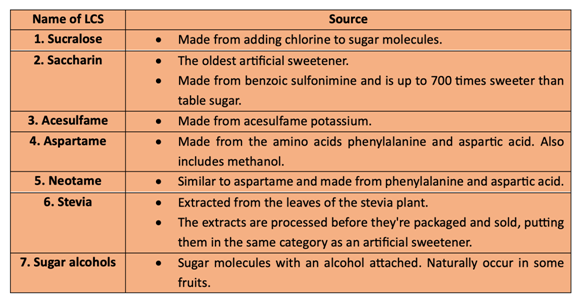Why in News?
- The World Health Organisation has recommended against using artificial sweeteners to achieve weight loss and prevent lifestyle diseases such as diabetes.
What’s in Today’s Article?
- About LCS/Artificial Sweeteners (Meaning, Examples, Benefits, Disadvantages)
- News Summary
What are Low-Calorie/Artificial Sweeteners?
- Low-calorie sweeteners (LCS) are sweeteners that contain few to no calories but have a higher intensity of sweetness per gram than sweeteners with calories—like table sugar, fruit juice concentrates, and corn syrups.
- Other names for LCS are non-nutritive sweeteners, artificial sweeteners, sugar substitutes, and high-intensity sweeteners.
- LCS sometimes carry the label “sugar-free” or “diet”. Some LCS can be used as general purpose sweeteners.
- LCS are found in many beverages and foods like frozen desserts, yogurt, candies, baked food items, chewing gum, breakfast cereals, gelatins, and puddings.
Common Low-Calorie/Artificial Sweeteners:

How Your Body Reacts to an Artificial Sweetener?
- When you eat regular sugar, your blood transports the sugar to your cells, where it’s either turned into energy or put into storage for later use.
- Sugar can be stored as glycogen (the body’s storage form of sugar) or turned into fatty acids and deposited into fat cells.
- On the other hand, most artificial sweeteners are man-made chemicals that the human body wasn’t designed to process.
- That said, our bodies are unable to absorb some artificial sweeteners.
- For example, sugar alcohols like xylitol or sorbitol don’t get absorbed. They sit in the GI tract, where they can cause gas, bloating or diarrhoea.
- If the artificial sweetener is absorbed, the body recognizes it as a foreign substance or toxin.
- Instead of going to different cells in our body, artificial sweeteners travel straight to our liver.
- The liver then has to get rid of them, similar to how your liver responds to drinking alcohol.
Benefits of Artificial Sweeteners:
- Sweetness without sugar –
- One of the main selling points of artificial sweeteners is the ability to add sweetness to foods without adding any actual sugar.
- Calorie control –
- Sugar substitutes have significantly less calories than real sugar.
- Most of them don't truly contain zero calories, but they contain such a negligible amount that manufacturers can write "No Calories" on the label.
- Used in weight-loss diet –
- Prior to beginning a weight-loss diet, a person may be accustomed to eating sugary beverages and foods.
- Consuming artificial sweeteners can provide a “bridge” for a person who’s changing their eating habits.
- It allows them to slowly wean off of real sugar and eventually cut out sweetened foods and beverages.
- Diabetics/Pre-diabetics –
- Artificial sweeteners don’ affect blood sugar the same way that real sugar does, making it useful for people managing diabetes or pre-diabetes.
Disadvantages/Side Effects of Artificial Sweeteners:
- Possible link to diseases –
- Articles published in Nature in 2014 reported that LCS ingestion in mice for 11 weeks led to the development of glucose intolerance by altering the gut microbiome.
- Saccharin fed mice (in high fat fed) developed marked glucose intolerance as compared to the control group.
- This intolerance was abolished by antibiotic treatment and even transferable by faecal transplantation, thereby confirming saccharin's role in rendering the microbiome unhealthy.
- This has raised alarms whether LCS use in humans can exacerbate metabolic disorders due to dysbiosis and raise the risk for progression to diabetes and obesity.
- May lead to more sugar cravings –
- Because artificial sweeteners aren’t real sugar, they may not satisfy your sugar cravings.
- This can lead to overeating to satisfy these cravings.
News Summary:
- Recently, the World Health Organisation (WHO) recommended against using artificial sweeteners to achieve weight loss and prevent lifestyle diseases such as diabetes.
- In a report published by the WHO, it was highlighted that while there was a need to cut intake of sugar, it should not be replaced by artificial sweeteners.
- While there could be some weight-loss and reduction in Body Mass Index in the short term as the artificial sweeteners bring down the calories consumed, but in the long run they have been linked to weight gain.
- The sweeteners have also linked to an increased risk of Type-2 diabetes, cardiovascular diseases, and mortality in the long run.
- Some low certainty data also linked the use of such artificial sweeteners to bladder cancer and preterm birth when consumed by pregnant women.
- The WHO has made these recommendations for everyone other than those who are already diabetic.
- However, the WHO has also pointed out that it was a “conditional recommendation” because the evidence was of low certainty.









